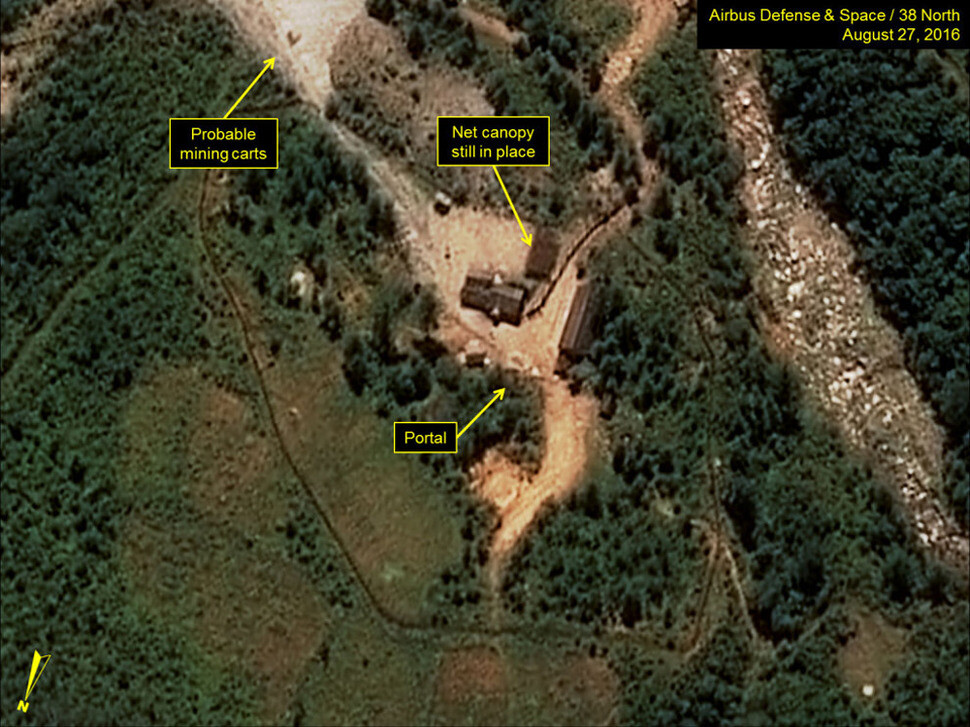hankyoreh
Links to other country sites 다른 나라 사이트 링크
[Editorial] Another North Korean nuke test shows that ‘strategic patience’ has failed

Following North Korea’s fifth nuclear test, skepticism is growing about the current approach to the North Korean nuclear issue. Both the hardliners and the moderates can agree that a reassessment of the current approach is needed.
First of all, the idea that sanctions on North Korea are limited in their effectiveness is being voiced by various figures in the US. Immediately after the nuclear test, the UN Security Council announced that it would take additional grave measures, and there are indications that several countries will enact their own additional sanctions. But it remains true that, without action from China, such sanctions will always be limited in their impact.
The policy of “strategic patience” toward North Korea that the administration of US President Barack Obama has adopted for the past seven years has clearly failed. The alternative is returning to negotiations. “Beyond sanctions, any lasting solution will almost certainly require some kind of negotiations,” the New York Times said in a typical expression of this idea. In the past, North Korea has made few provocations when it was in the middle of negotiations.
The South Korean government is also largely responsible for the fact that the US, a key player in resolving the North Korean nuclear issue, has basically been a bystander here, in contrast with the Iranian nuclear program. The Obama administration has played along with the hardline North Korean policy of the administrations of Lee Myung-bak (2008-2013) and Park Geun-hye (2013-present) and talked about focusing on cooperation with Seoul. Since Washington puts the priority on its Asian rebalance, which is aimed at China, it has had little motivation to concentrate on resolving the North Korean nuclear issue.
If the South Korean government had actively pursued resolving the North Korean nuclear issue through dialogue, the US attitude would likely have been different, too. The drastic worsening of the nuclear issue over the past few years is also the fault of the South Korean government. Owning up to this and reassessing current policy is the only way to find a viable solution.
The primary reason that North Korean leader Kim Jong-un is repeating these nuclear tests is probably to ensure the survival of his regime. Of all the parties involved with the Korean Peninsula, North Korea is the weakest and the most isolated internationally. In such a solution, North Korea cannot expand its international influence even if it has nuclear weapons. All it is doing is alarming the international community and making it gradually more difficult to sustain its regime.
Helping North Korea to perceive this reality and persuading the North that it can survive even without nuclear weapons must be the basis for solving the nuclear issue. This is also an approach that China could be persuaded to enthusiastically support.
Kim Jong-un has been in power for less than five years, but he has ordered no fewer than three nuclear tests. Along with the two nuclear tests this year, Pyongyang has fired dozens of ballistic missiles that could be a delivery vehicle for a nuclear weapon. North Korean behavior is the flip side of South Korean and American policy toward North Korea. That is, Pyongyang’s actions are linked to policy in Seoul and Washington.
The US is unlikely to reassess its North Korean policy right away, considering that Obama’s term in office is nearly over, but if the South Korean government showed a little gumption, the situation could definitely change.
Please direct questions or comments to [english@hani.co.kr]

Editorial・opinion
![[Editorial] Perilous stakes of Trump’s rhetoric around US troop pullout from Korea [Editorial] Perilous stakes of Trump’s rhetoric around US troop pullout from Korea](https://flexible.img.hani.co.kr/flexible/normal/500/300/imgdb/original/2024/0509/221715238827911.jpg) [Editorial] Perilous stakes of Trump’s rhetoric around US troop pullout from Korea
[Editorial] Perilous stakes of Trump’s rhetoric around US troop pullout from Korea![[Guest essay] Preventing Korean Peninsula from becoming front line of new cold war [Guest essay] Preventing Korean Peninsula from becoming front line of new cold war](https://flexible.img.hani.co.kr/flexible/normal/500/300/imgdb/original/2024/0507/7217150679227807.jpg) [Guest essay] Preventing Korean Peninsula from becoming front line of new cold war
[Guest essay] Preventing Korean Peninsula from becoming front line of new cold war- [Column] The state is back — but is it in business?
- [Column] Life on our Trisolaris
- [Editorial] Penalties for airing allegations against Korea’s first lady endanger free press
- [Editorial] Yoon must halt procurement of SM-3 interceptor missiles
- [Guest essay] Maybe Korea’s rapid population decline is an opportunity, not a crisis
- [Column] Can Yoon steer diplomacy with Russia, China back on track?
- [Column] Season 2 of special prosecutor probe may be coming to Korea soon
- [Column] Park Geun-hye déjà vu in Yoon Suk-yeol
Most viewed articles
- 1Nuclear South Korea? The hidden implication of hints at US troop withdrawal
- 2‘Free Palestine!’: Anti-war protest wave comes to Korean campuses
- 3[Editorial] Perilous stakes of Trump’s rhetoric around US troop pullout from Korea
- 4In Yoon’s Korea, a government ‘of, by and for prosecutors,’ says civic group
- 5With Naver’s inside director at Line gone, buyout negotiations appear to be well underway
- 6[Photo] ‘End the genocide in Gaza’: Students in Korea join global anti-war protest wave
- 7Seoul getting its first-ever vertical farm
- 8Gangnam murderer says he killed “because women have always ignored me”
- 9‘We must say no’: Seoul defense chief on Korean, USFK involvement in hypothetical Taiwan crisis
- 10Korean president’s jailed mother-in-law approved for parole